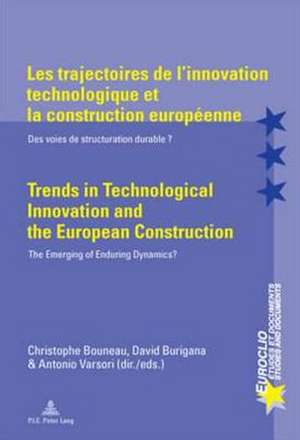Les Trajectoires de L'Innovation Technologique Et La Construction Europeenne. Trends in Technological Innovation and the European Construction: Des Vo: Euroclio, cartea 56
Editat de Christophe Bouneau, David Burigana, Antonio Varsorifr Limba Franceză Paperback – 27 iul 2010
Din seria Euroclio
-
 Preț: 379.47 lei
Preț: 379.47 lei -
 Preț: 325.00 lei
Preț: 325.00 lei -
 Preț: 387.57 lei
Preț: 387.57 lei -
 Preț: 399.90 lei
Preț: 399.90 lei -
 Preț: 362.45 lei
Preț: 362.45 lei -
 Preț: 408.87 lei
Preț: 408.87 lei -
 Preț: 242.54 lei
Preț: 242.54 lei -
 Preț: 334.53 lei
Preț: 334.53 lei -
 Preț: 431.51 lei
Preț: 431.51 lei -
 Preț: 443.46 lei
Preț: 443.46 lei -
 Preț: 327.18 lei
Preț: 327.18 lei -
 Preț: 373.47 lei
Preț: 373.47 lei -
 Preț: 335.40 lei
Preț: 335.40 lei - 8%
 Preț: 446.33 lei
Preț: 446.33 lei -
 Preț: 395.33 lei
Preț: 395.33 lei -
 Preț: 391.63 lei
Preț: 391.63 lei - 7%
 Preț: 253.31 lei
Preț: 253.31 lei - 6%
 Preț: 293.61 lei
Preț: 293.61 lei -
 Preț: 344.05 lei
Preț: 344.05 lei -
 Preț: 351.50 lei
Preț: 351.50 lei - 7%
 Preț: 268.84 lei
Preț: 268.84 lei - 20%
 Preț: 363.97 lei
Preț: 363.97 lei - 7%
 Preț: 293.32 lei
Preț: 293.32 lei
Preț: 253.87 lei
Preț vechi: 271.85 lei
-7% Nou
Puncte Express: 381
Preț estimativ în valută:
48.58€ • 50.54$ • 40.11£
48.58€ • 50.54$ • 40.11£
Carte indisponibilă temporar
Doresc să fiu notificat când acest titlu va fi disponibil:
Se trimite...
Preluare comenzi: 021 569.72.76
Specificații
ISBN-13: 9789052016054
ISBN-10: 9052016054
Pagini: 259
Ilustrații: 9, 9 tabl.
Dimensiuni: 221 x 152 x 19 mm
Greutate: 0 kg
Ediția:1 New ed.
Editura: Peter Lang Gmbh, Internationaler Verlag Der W
Seria Euroclio
ISBN-10: 9052016054
Pagini: 259
Ilustrații: 9, 9 tabl.
Dimensiuni: 221 x 152 x 19 mm
Greutate: 0 kg
Ediția:1 New ed.
Editura: Peter Lang Gmbh, Internationaler Verlag Der W
Seria Euroclio
Notă biografică
Les responsables de la publication: Christophe Bouneau: Professeur d'histoire économique contemporaine à l'Université de Bordeaux et directeur de la Maison des Sciences de l'Homme d'Aquitaine (MSHA). Spécialiste de l'histoire des réseaux techniques et de l'énergie, du développement régional, de l'innovation et du tourisme, il codirige un programme international de recherches sur ' Les trajectoires de l'innovation '. Il a publié notamment Les réseaux électriques au coeur de la civilisation industrielle (2007).David Burigana: DEA (1997) en Histoire contemporaine (La Sorbonne-Paris IV), Docteur (2002) en Histoire des Relations Internationales (Firenze), boursier de recherche (2005) à l'IHEEE (Université de Strasbourg III), et (2006-2011) à l'Université de Padoue, Professeur invité (2010) à l'Université de Toulouse-Le Mirail, auteur de Armi e Diplomazia. L'Unione Sovietica e le origini della Seconda Guerra Mondiale (1919-39) (Firenze, 2006), ses recherches portent sur la diplomatie et la coopération technologique militaire et civile.Antonio Varsori: Professeur d'Histoire des Relations Internationales à l'Université de Padoue où il est le Directeur du Département d'Etudes Internationales, et il est l'auteur de La Cenerentola d'Europa? L'Italia e l'integrazione europea dal 1946 a oggi (2010), et avec Wolfram Kaiser (dir.), European Union History. Themes and debates (2010).The Editors: Christophe Bouneau: Professor in contemporary economic history at Bordeaux University, he is a specialist of economic networks and industrial territorial dynamics. Since 2002, he is director of the Institute of Humanities and Social Sciences in Aquitaine (Maison des Sciences de l'Homme d'Aquitaine, Bordeaux). On that behalf he has managed and coordinated several interdisciplinary research programmes on national and international levels, with varied academic international collaboration, especially on 'logics and trajectories of innovation'. He had notably published Les réseaux électriques au coeur de la civilisation industrielle (2007).David Burigana: Has a masters in contemporary history (La Sorbonne-Paris IV, 1997), and a PhD in history of international relations (Firenze, 2002), and has held a research fellowship at IHEEE (University of Strasbourg III, 2005) and at the University of Padua (2006-2011) and a visiting professorship at the University of Toulouse 2 (2010). He is the author of Armi e Diplomazia. L'Unione Sovietica e le origini della Seconda Guerra Mondiale (1919-39) (2006). His research interests are in diplomacy and civil and military technological cooperation.Antonio Varsori: Is full professor of the History of International Relations at the University of Padua, where he is also the Head of the Department of International Studies, and he is author of La Cenerentola d'Europa? L'Italia e l'integrazione europea dal 1946 a oggi (2010), and with Wolfram Kaiser (eds.), European Union History. Themes and debates (2010).
Cuprins
Contenu/Contents: Christophe Bouneau/David Burigana/Antonio Varsori: Introduction - Pascal Griset: Les technologies de l'information et de la communication, réalités et faux semblants d'une ' ambition ' européenne - Laura Grazi/Laura Scichilone: Environmental Issues in the Improvement of Living and Working Conditions. Innovative Elements in the Process of European Integration during the 1970s - Arthe Van Laer: Vers une politique de recherche commune. Du silence du Traité CEE au titre de l'Acte unique - Johan Schot: Transnational Infrastructures and European Integration. A Conceptual Exploration - Francesco Petrini: L'Europe occidentale et la première crise pétrolière. S'assurer l'énergie par la coopération technologique - Mauro Elli: European Cooperation and Technological Innovation. Applied Research in the OEEC Halden Reactor Project - Yves Bouvier: L'industrie électrique européenne depuis la Seconde Guerre mondiale. Des technologies nationales aux marchés européens - Christophe Bouneau: Les trajectoires de l'innovation et la construction de l'espace européen électrique depuis les années 1950 - Sigfrido Ramirez Pérez: Automobile Standardisation in Europe. Between Technological Choices and Neo-protectionism - Filippo Pigliacelli: Space: another Field of European Integration? - David Burigana: ¿Le jeu de dupes'... The SNECMA/General Electric Agreement or Survival and Cooperation in Aircraft Cooperation between 'Communitarian' Tensions and Atlantic Alliance.
